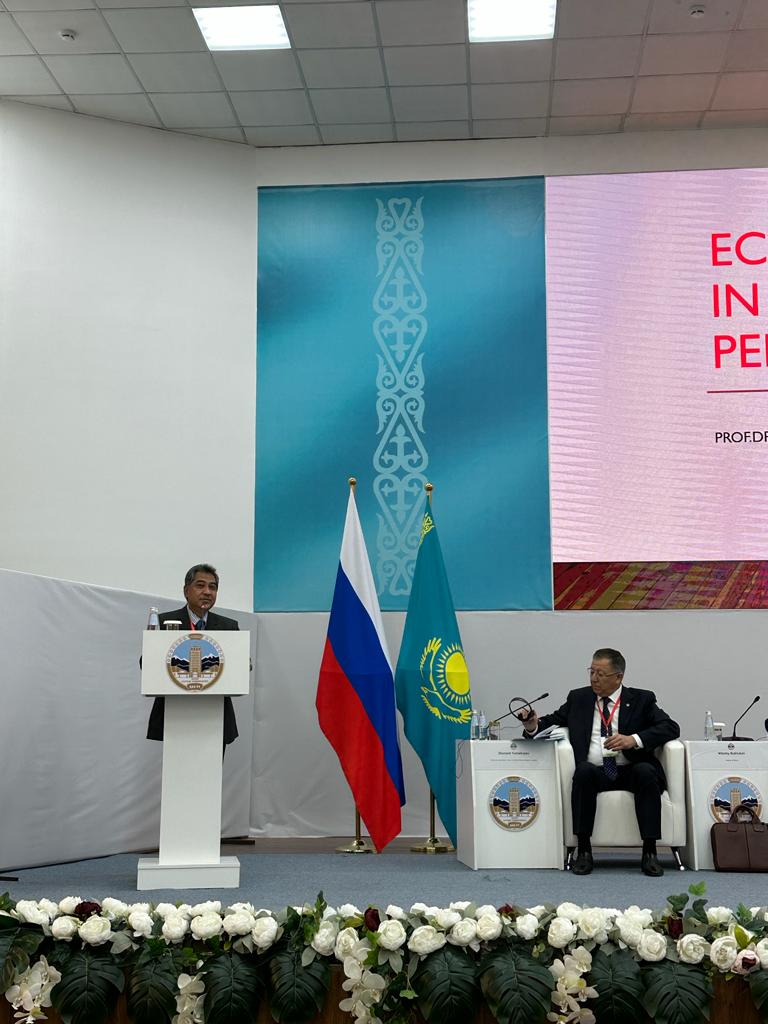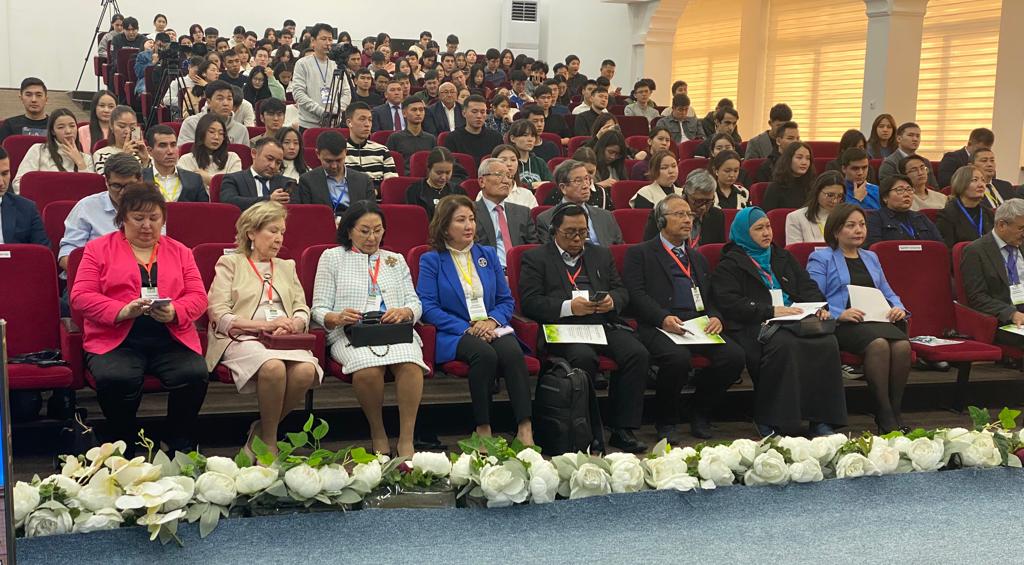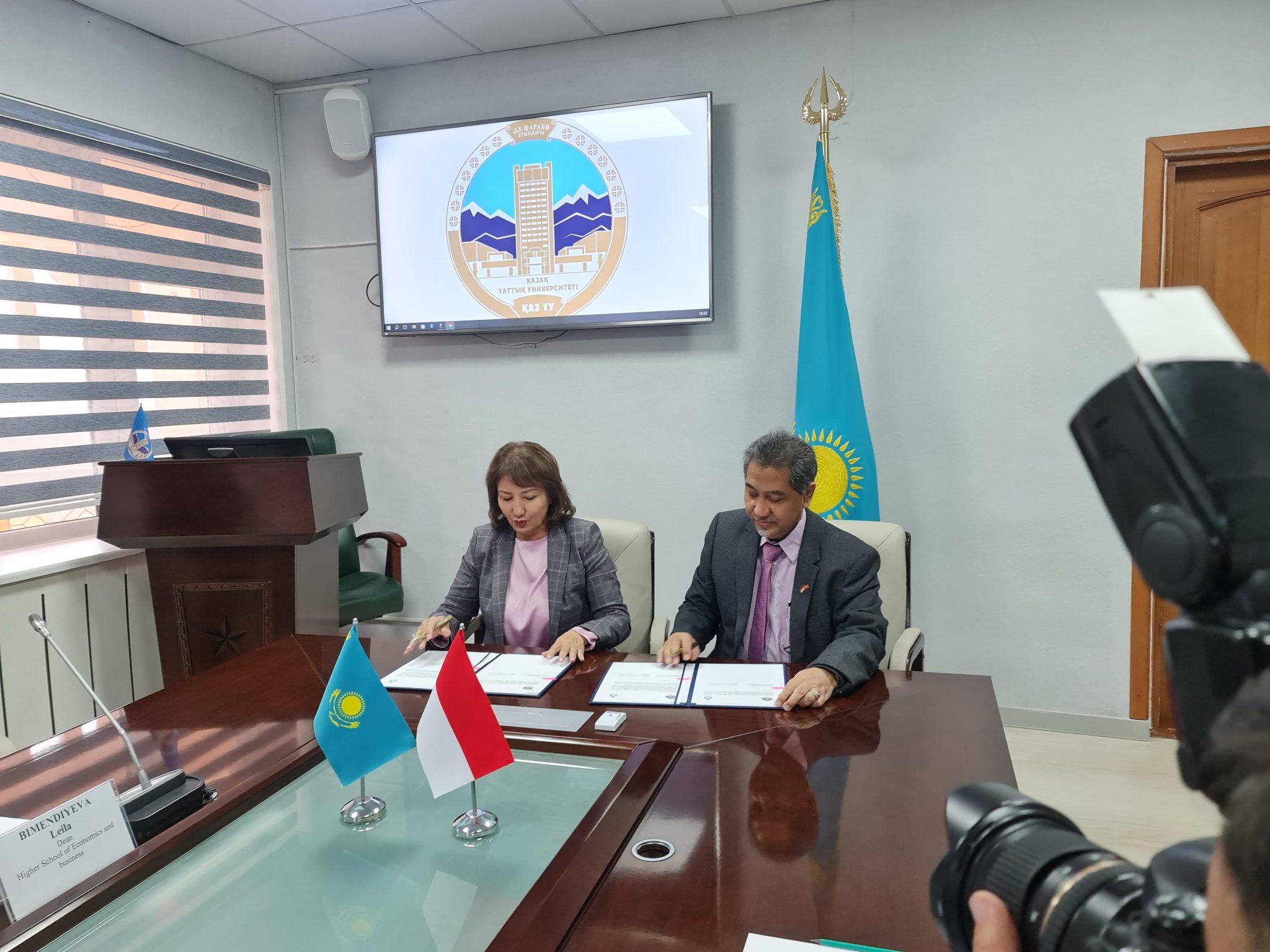The Rector of University of Darussalam (UNIDA) Gontor received an invitation from al-Farabi Kazakhstan National University in Almaty, Kazakhstan, to deliver a keynote speech at the First International Scientific Conference “A New Way of Decarbonization of the Economy” (KZGT-2023). The event, held in collaboration with Peter the Great St Petersburg Polytechnic, took place from November 8 to 10, 2023.
The Plenary Session in the conference, moderated by the Rector of al-Farabi Kazakhstan National University, Tuimebayev Zhanseit, featured six keynote speakers: Prof. Dr. Askar Askerovich Akauly (Moscow University), Buktokov Nikolay (National Academy of Sciences of Kazakhstan), Prof. Dr. Nigmatulin Robert Iskandrovich (Russian Academy of Science), Prof. Dr. Khusainov Bulat (Economic Research Institute Kazakhstan), Prof. Dr. Shirov Alexander (Director of the Institute for Economic Forecasting of the Russian Academy of Sciences), and Prof. Dr. Hamid Fahmy Zarkasyi (UNIDA Gontor). The scientific experts generally discussed the fundamental principles for human efforts to reduce carbon emissions, which remain an unresolved issue. It was the Rector of UNIDA Gontor, however, who spoke about ecology from the perspective of religion or morality, adding a unique and meaningful dimension to the conference.
Prof. Dr. Hamid Fahmy Zarkasyi delivered his keynote speech titled “Eco-Theology in Islamic Worldview Perspective.” In his address, Prof. Hamid discussed various schools within the discourse and practice of ecology. He began by mentioning the ecological teleology, which views nature as existing with a specific purpose. Following this, there emerged the secular, humanist, and atheist ecology, perceiving nature as self-existing, operating mechanically, and exploitable at the discretion of humans. Prof. Hamid argued that with such worldviews, these ecological paradigms inadvertently contribute to environmental degradation.
Hence, emerged the eco-sophy, deep-ecology, scientific-technological ecology, all striving to improve perspectives on the environment. However, these views lack a comprehensive foundation and tend to prioritize nature over humanity. Consequently, a new awareness emerged, known as eco-theology, which bases its principles on theology. This view perceives nature as God’s creation, emphasizing human responsibility towards it. In eco-theology, morality plays a crucial role, underscoring the significance of ethical considerations in the relationship between humans and the environment.
In explaining these views, Prof. Hamid conducted a critical analysis of the worldviews of each, including eco-theology. Among these perspectives, some align with certain concepts in Islam, although generally not as comprehensive as Islamic principles. Within Islamic eco-theology, three interconnected concepts are central: the concept of God as the Creator, the concept of tawhid (oneness of God), and the concept of humans as khalifah (stewards or vicegerents). These three concepts demonstrate a close relationship between belief, thought (concept), and action, consistently infused with strong moral values. Prof. Hamid’s exposition received applause from the audience, predominantly composed of postgraduate students.
In response to Prof. Hamid’s speech, Prof. Dr. Nigmatulin Robert Iskandrovich, an expert in oceanology, former advisor to the President of Russia, and several of its regions, spontaneously expressed his appreciation for Prof. Hamid’s address. According to him, what Prof. Hamid conveyed was highly accurate because technological advancements cannot disregard morality. Furthermore, he emphasized that the mindset and morality of human resources are inseparable components of human development.
Similarly, in response to Prof. Hamid’s exposition on the importance of changing human perspectives regarding the universe and ecology, Prof. Dr. Askar Askerovich Akauly, a Professor at Moscow State University, stated that humans are the primary and largest driving force behind environmental and Earth changes. In this regard, he emphasized that human perspectives wield a highly significant influence in shaping the environment.
In addition to the two aforementioned professors, Prof. Dr. Yury A Plakitkin, the Head of the Centre for Analysis of Innovations in Energy at the Russian Academy of Natural Science, personally expressed his utmost appreciation for Prof. Hamid’s presentation on the importance of strengthening human morality. He asserted that humans are the primary factor in environmental degradation. According to him, the Earth and its resources are already sufficient to meet human needs, but human ego and personal interests make it seem inadequate. This underscores the necessity for humans to possess strong moral values.
Following the responses of the scientists, Professor in the field of economics, Prof. Dr. Madi Baidauletovich, didn’t want to be left behind. He emphasized the need to instil the right perspective in the current youth. According to him, many young people today are departing from morality due to incorrect perspectives.
After the conclusion of the plenary session, the issue of the “New Way of Decarbonization” was discussed more thoroughly in the afternoon session. Meanwhile, on the second day of the conference, Assoc. Prof. Dr. Akhmad Affandi Mahfudz, CPIF, a faculty member of the Faculty of Economics and Management at UNIDA Gontor, presented his paper. As a Visiting Professor at al-Farabi Kazakhstan University specializing in Islamic finance, he delivered a paper titled “Sustainable linked-Sukuk to Reduce Carbon Emissions Initiative.” This presentation stood out as the only one in the conference addressing Islamic finance (Sukuk), providing an alternative financial instrument for funding decarbonization efforts.
International Partnership between UNIDA Gontor and al-Farabi Kazakhistan National University
During the visit to al-Farabi Kazakhstan National University to deliver a keynote speech, UNIDA’s Rector, Prof. Dr. Hamid Fahmy Zarkasyi, undertook another mission, which was to sign a Memorandum of Understanding (MoU). This collaboration is highly strategic, as al-Farabi Kazakhstan National University is the top university in the country and ranks 150th in the Global University Ranking. Its campus spans no less than 47 hectares, accommodating 27,000 students, 5,000 faculty members and staff. Among the total student population, 12,000 reside in dormitories.
In the MoU, three crucial programs were agreed upon: student mobility or exchange, collaborative research, and scholarly publications.
For the effective implementation of the MoU and MoA, the Rector brought along several faculty members from the Faculty of Economics and Management to participate in a Focus Group Discussion (FGD). The program, conducted with faculty members from the Business and Economics School, included Dr. Effendi Makhfud, Dr. Moh. Ridlo, Dr. Meitri Cahyani, and Dr. Rahmat Agung, a doctoral candidate. The FGD, opened by the Dean of the Business and Economics School, focused on Islamic Human Resource Development (I-HRD). This FGD is part of the Regular Fundamental Research funded by the Research Grant from the Ministry of Education and Culture for the 2023 fiscal year. The research, led by Prof. Dr. Hamid Fahmy Zarkasyi, includes Assoc. Prof. Dr. Fuad Masud, Rahmad Agung Hidayatullah MA, and Usmanul Khakim MA as team members.
Red: Rakhmad Agung







